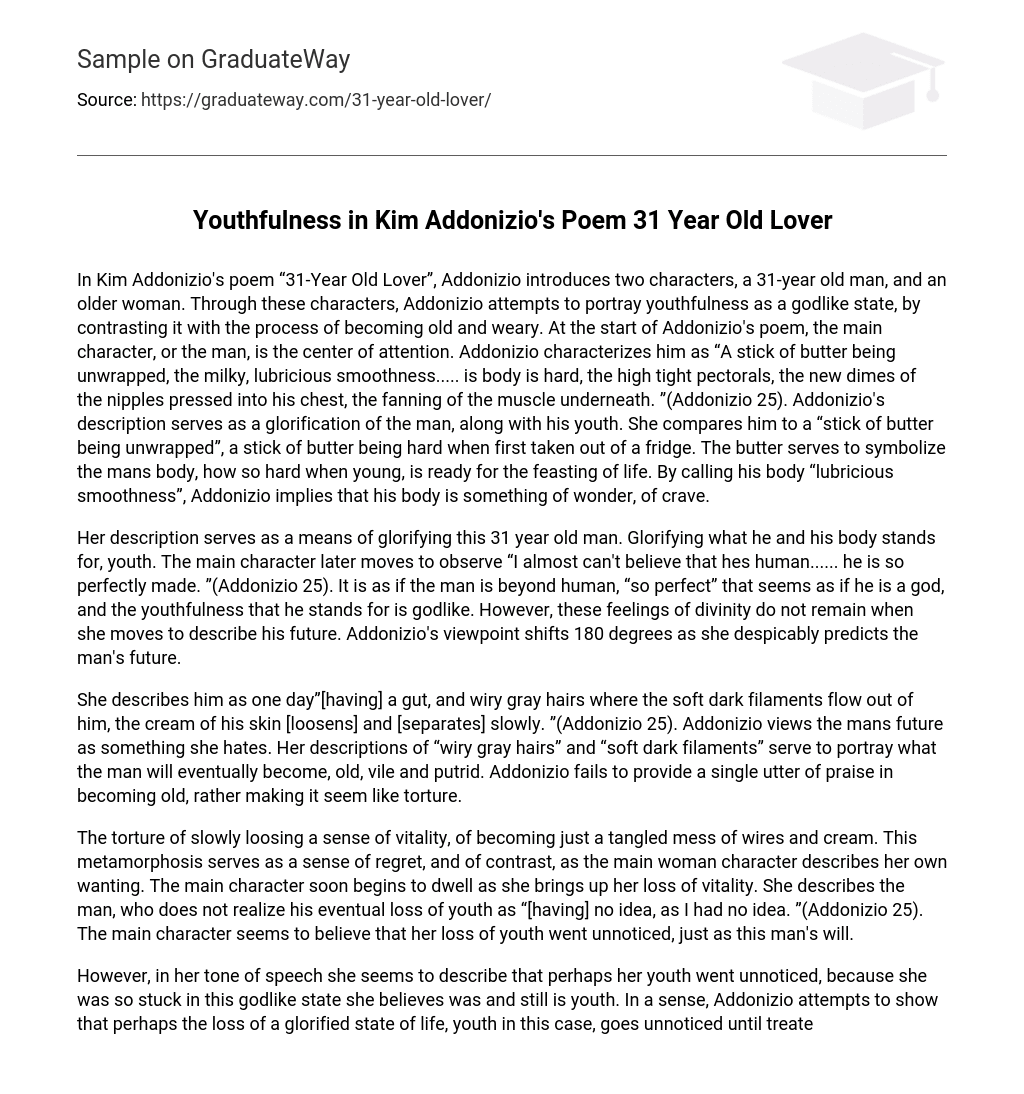In Kim Addonizio’s poem “31-Year Old Lover”, Addonizio introduces two characters, a 31-year old man, and an older woman. Through these characters, Addonizio attempts to portray youthfulness as a godlike state, by contrasting it with the process of becoming old and weary. At the start of Addonizio’s poem, the main character, or the man, is the center of attention. Addonizio characterizes him as “A stick of butter being unwrapped, the milky, lubricious smoothness….. is body is hard, the high tight pectorals, the new dimes of the nipples pressed into his chest, the fanning of the muscle underneath. ”(Addonizio 25). Addonizio’s description serves as a glorification of the man, along with his youth. She compares him to a “stick of butter being unwrapped”, a stick of butter being hard when first taken out of a fridge. The butter serves to symbolize the mans body, how so hard when young, is ready for the feasting of life. By calling his body “lubricious smoothness”, Addonizio implies that his body is something of wonder, of crave.
Her description serves as a means of glorifying this 31 year old man. Glorifying what he and his body stands for, youth. The main character later moves to observe “I almost can’t believe that hes human…… he is so perfectly made. ”(Addonizio 25). It is as if the man is beyond human, “so perfect” that seems as if he is a god, and the youthfulness that he stands for is godlike. However, these feelings of divinity do not remain when she moves to describe his future. Addonizio’s viewpoint shifts 180 degrees as she despicably predicts the man’s future.
She describes him as one day”[having] a gut, and wiry gray hairs where the soft dark filaments flow out of him, the cream of his skin [loosens] and [separates] slowly. ”(Addonizio 25). Addonizio views the mans future as something she hates. Her descriptions of “wiry gray hairs” and “soft dark filaments” serve to portray what the man will eventually become, old, vile and putrid. Addonizio fails to provide a single utter of praise in becoming old, rather making it seem like torture.
The torture of slowly loosing a sense of vitality, of becoming just a tangled mess of wires and cream. This metamorphosis serves as a sense of regret, and of contrast, as the main woman character describes her own wanting. The main character soon begins to dwell as she brings up her loss of vitality. She describes the man, who does not realize his eventual loss of youth as “[having] no idea, as I had no idea. ”(Addonizio 25). The main character seems to believe that her loss of youth went unnoticed, just as this man’s will.
However, in her tone of speech she seems to describe that perhaps her youth went unnoticed, because she was so stuck in this godlike state she believes was and still is youth. In a sense, Addonizio attempts to show that perhaps the loss of a glorified state of life, youth in this case, goes unnoticed until treated with something vile. She bolsters this idea, when she describes herself as wanting her youth back from this man, “I am going to let him stretch out on my bad so I can take the heavy richness of him in and in. I am going to have it back the only way I can. (Addonizio). This final moment, of the woman’s lust for youth, depicts the glorification of being young; of how appealing it is compared to being old, of having your skin loose and your hair wiry. The fact that this woman is making an attempt to regain it, to reforge the lost youth inside of her, serves to show how powerful and magnificent the thirst for youth is, once lost. In the end Addonizio glorifies youthfulness by contrasting it to the vileness of oldness. She portrays the loss with bitterness as if by losing youth, you lose your life.
However, the loss of youth does not have to be that of sorrow, or fear of apprehension. We are mortal, and we can’t change that, however, we can learn to live to appreciate what we have and what we won’t have. Rather than believing that youth in itself is a predator against ourselves, youth serves as a companion, going with us on our journey and reminding us to cherish every moment we have, because it will never come again. If we were all to cherish our youth(including you Bob! ) that we possess, then this world could become a truly marvelous place to live.





